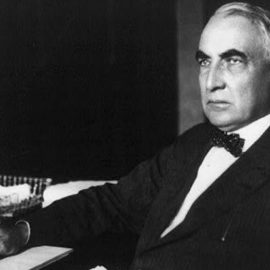

This article is an excerpt from the Shortform book guide to "The Power of Your Subconscious Mind" by Joseph Murphy. Shortform has the world's best summaries and analyses of books you should be reading.
Like this article? Sign up for a free trial here .
What exactly is a self-fulfilling prophecy? How do expectations influence behavior?
A self-fulfilling prophecy is a psychological phenomenon whereby your (originally false) expectations manifest in your actual reality. In other words, by anticipating a certain outcome, you start behaving in ways to make it come true. For example, if you fear your partner will leave you, you could start acting in ways that push them way (even though, originally there was no basis to believe so).
In this article, we’ll explore how negative expectations can turn into a negative self-fulfilling prophecy.
You Manifest Your Fear Into Reality
When you allow your negative thoughts to dominate your positive thoughts, you develop unhealthy mental patterns that lead to low self-esteem and psychological problems such as anxiety, addictions, and phobias. Murphy argues that these mental patterns prevent you from seeing the best in yourself and others, and they encourage you to develop negative expectations about everyone and everything around you. As a result, your subconscious mind creates failure instead of success and happiness.
For example, your habitual negative thoughts make you feel insecure about your relationship with your partner. The more you focus on the negative things that could happen (he’ll leave, he’ll cheat, he’ll get bored), the less able you are to notice what’s working well in your relationship. Instead, you constantly feel threatened and your insecurities make you act in ways that push your partner away (jealous, overbearing, critical). According to Murphy, your fear of abandonment turns into a negative self-fulfilling prophecy. Your subconscious mind believes this negative expectation and ensures its manifestation by creating circumstances that both align with and fuel your insecurities.
| Cognitive Distortions Perpetuate Irrational Behavior Research on the topic of cognitive distortions supports Murphy’s argument that negative thoughts contribute to low self-esteem and psychological problems. Cognitive distortions are irrational thought patterns that manifest as negative emotions, increased anxiety, depression, and mental illness. They’re more likely to occur when you habitually think negative thoughts. This is because your subconscious mind gets used to processing everything it perceives in a negative light so much so that you wire your brain to always respond negatively to your experiences. According to this research, negative thinking causes negative mental states and emotions. These negative emotions lead people to act irrationally. But, due to a lack of self-awareness, many people find it difficult to recognize when they’re engaged in negative or irrational thinking. As a result of their failure to recognize their negative thoughts, they mistakenly assume that external causes are to blame both for their emotional states and their resulting actions. The following examples illustrate the association between an external cause and a resulting action: Work is stressful. This drives you to drink too much. Your kids are loud. This drives you to lash out at them. Spiders are creepy. This drives you to panic when you see one. However, once you recognize the impact that your thoughts have on your emotions, you’re able to view the causes of your actions in a different light: Your thoughts about work make you feel stressed. These stressful thoughts drive you to drink too much. Your thoughts about how irritating your kids are, make you feel angry. Your anger drives you to lash out at them. Your focus on how revolting spiders are makes you feel afraid. Your fear fuels your phobia and drives you to panic when you see one. Once you understand how your thoughts impact your emotions and behaviors, you can learn to manage them in a more positive way. To achieve this, you first need to become aware of how you choose to think about your experiences and how these thoughts make you feel. Next, you need to make the effort to change your thoughts so that you can improve the way that you feel. Once you improve your feelings, you’ll naturally engage in more positive behaviors. For example, you catch yourself feeling stressed out about work. You realize that these stressful thoughts are not helping you to act positively or rationally so you decide to take a break and go for a walk. As a result, you feel refreshed and calm. This gives you the mental space to prioritize your workload and to get things done more positively. As you reduce your stressful thoughts, you also reduce your urge to escape into drink. |

———End of Preview———
Like what you just read? Read the rest of the world's best book summary and analysis of Joseph Murphy's "The Power of Your Subconscious Mind" at Shortform .
Here's what you'll find in our full The Power of Your Subconscious Mind summary :
- How your subconscious mind creates your life experiences
- How to improve your life experiences by using your conscious mind to influence your subconscious
- Why we're all designed to experience happiness






